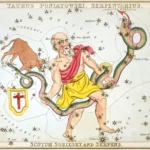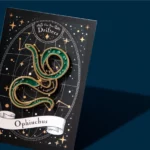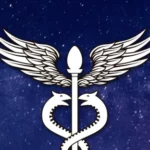Unlocking the Secrets: The Mythology Behind the Ophiuchus Constellation
For centuries, humans have been fascinated by the celestial wonders that adorn the night sky. One such constellation that has captured the imagination of astronomers, astrologers, and mythology enthusiasts alike is Ophiuchus. Often referred to as the serpent-bearer, this enigmatic constellation holds a rich tapestry of ancient legends and cultural interpretations. From the mythical healer Asclepius to the controversial 13th zodiac sign, Ophiuchus continues to intrigue and mystify. Join us on a journey as we delve into the mysterious origins, ancient connections, astrology controversies, and modern interpretations of this mesmerizing constellation. Prepare to unravel the veils of secrecy surrounding Ophiuchus and unlock the hidden wisdom it holds.
Contents
- The Origin of Ophiuchus
- Ophiuchus in Ancient Cultures
- Ophiuchus in Astrology
- The Stars of Ophiuchus
- The Modern Interpretation
- Conclusion
- Frequently Asked Questions
- References
-
Frequently Asked Questions
- 1. What is the significance of the Ophiuchus constellation?
- 2. Is Ophiuchus considered a zodiac sign?
- 3. Who was Asclepius and what is his connection to Ophiuchus?
- 4. How did Ophiuchus influence ancient Egyptian culture?
- 5. What is the story of Gilgamesh and Enkidu in relation to Ophiuchus?
- 6. How does Ophiuchus impact astrology and horoscope readings?
- 7. Are there specific personality traits associated with Ophiuchus?
- 8. What are some notable stars in the Ophiuchus constellation?
- 9. How is Ophiuchus symbolically associated with the field of medicine?
- 10. How is the Ophiuchus constellation observed and celebrated today?
- References
- Read More
The Origin of Ophiuchus
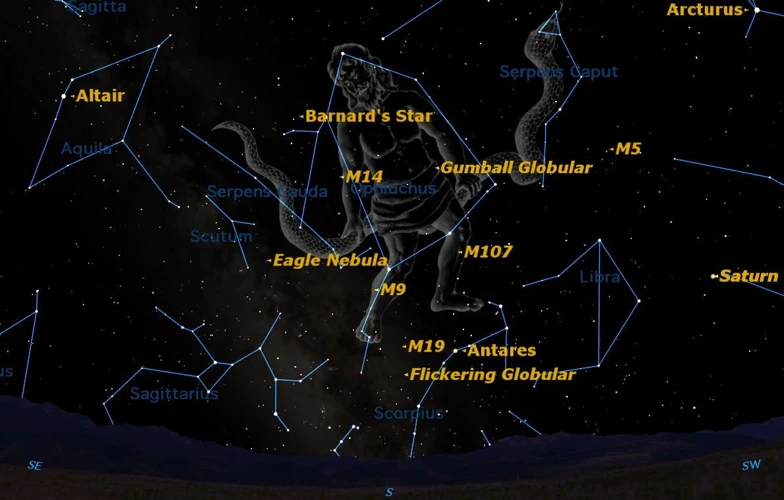
The Origin of Ophiuchus
The mythological roots of the Ophiuchus constellation can be traced back to ancient Greek and Egyptian civilizations. According to Greek legend, Ophiuchus represents the renowned healer Asclepius, the son of Apollo. Asclepius was known for his exceptional abilities in the field of medicine and was revered as the god of healing and medicine. His symbol, often associated with Ophiuchus, is the serpent entwined around a staff, known as the Rod of Asclepius. This symbol continues to be widely recognized in the medical field to this day. In Egyptian mythology, Ophiuchus is believed to have a connection with the architect and physician Imhotep, who was later deified as a god. Imhotep, known for his supernatural healing abilities, is considered to be the precursor to the Greek deity Asclepius. The intertwining stories of Asclepius and Imhotep bring forth a rich heritage and intriguing history surrounding the origin of Ophiuchus. (source: mythologs..com)
The Legend of Asclepius
The Legend of Asclepius
In Greek mythology, the legend of Asclepius is deeply intertwined with the Ophiuchus constellation. Asclepius, the son of the Greek god Apollo and a mortal woman named Coronis, possessed incredible healing powers from birth. As he grew older, he honed his skills in the art of medicine under the tutelage of the centaur Chiron, renowned for his wisdom and expertise.
Asclepius became a legendary healer, known for his ability to bring the dead back to life. This miraculous power garnered the attention of Hades, the god of the underworld, who voiced concerns about the rising number of deceased souls returning to the land of the living. In response, Zeus, the king of the gods, struck Asclepius down with a thunderbolt, fearing that his mastery over life and death would disrupt the natural order.
Despite his demise, Asclepius continued to be revered as a demigod and was eventually immortalized in the night sky as the constellation Ophiuchus. The serpent entwined around his staff became a symbol of healing and medicine, widely recognized even today as the emblem of the medical profession. The legend of Asclepius exemplifies the eternal quest for healing and the enduring power of compassion in alleviating suffering.
While Ophiuchus is often excluded from the traditional zodiac system, its link to the myth of Asclepius brings forth intriguing discussions on its astrological implications. Some argue that Ophiuchus represents a thirteenth zodiac sign, offering unique personality traits and compatibility profiles. Whether you consider Ophiuchus as part of your astrological journey or appreciate it solely for its mythological significance, there is no denying the captivating allure of the legend of Asclepius in relation to this celestial constellation. (source: mythologs..com)
The Serpent and the Healing Rod
The Serpent and the Healing Rod
At the heart of the mythology surrounding Ophiuchus lies the captivating tale of the serpent and the healing rod. In Greek mythology, this story revolves around Asclepius, the renowned healer and son of Apollo. Legend has it that Asclepius possessed an exceptional ability to restore life and heal the incurable. This extraordinary power drew the attention of the gods, and they soon became envious of his skills. In their jealousy, Zeus struck Asclepius down with a thunderbolt, fearing that his abilities would disrupt the balance between mortals and the divine. However, Apollo, filled with grief, intervened and pleaded with Zeus to reconsider. Touched by Apollo’s pleas, Zeus transformed Asclepius into a constellation, Ophiuchus, and placed him among the stars. As part of his divine representation, Ophiuchus is often depicted holding a healing rod with a serpent entwined around it, known as the Rod of Asclepius. This symbol, recognized across the medical community, serves as a timeless reminder of the healing powers associated with Ophiuchus and the everlasting impact of Asclepius’ legacy. (source: mythologs..com)
Ophiuchus in Ancient Cultures
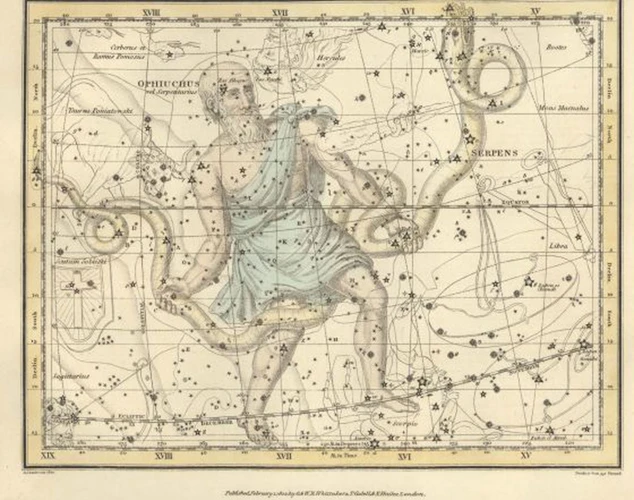
Ophiuchus in Ancient Cultures
The enigmatic Ophiuchus constellation holds a prominent place in the mythologies of various ancient cultures. In ancient Egypt, Ophiuchus is closely linked with the legendary figure of Imhotep, who was revered as a healer and considered the patron of medicine and science. Imhotep’s healing abilities were so revered that he eventually achieved divine status. In Greek mythology, Ophiuchus is associated with the deity Asclepius, renowned for his skills in healing and medicine. Asclepius was the son of Apollo and the symbol of the serpent entwined around a staff, known as the Rod of Asclepius, is a potent and recognizable emblem in the medical field. Additionally, Babylonian culture portrays Ophiuchus through the epic tale of Gilgamesh and Enkidu. These ancient civilizations recognized the significance of Ophiuchus, attributing healing powers and divine connections to this celestial constellation. (source: ancientmyths..com)
Egyptian Connection: Imhotep
The Egyptian Connection: Imhotep
Imhotep, a name synonymous with wisdom and healing, is a prominent figure in the Egyptian mythology that is intricately linked to the Ophiuchus constellation. Imhotep, who lived in the 27th century BCE, was a multi-talented individual who served as the chief architect and physician to Pharaoh Djoser. He was known for his extraordinary skills in various fields, including architecture, medicine, and astronomy. Imhotep’s role as a healer and physician made him greatly revered by the Egyptians, and he was later deified as a god of healing. Interestingly, the serpent, which is a significant symbol in Ophiuchus, plays a vital role in Imhotep’s mythology as well. In Egyptian culture, the serpent was associated with healing and protection. Imhotep’s association with the serpent showcases the deep connection between his healing expertise and the ancient symbolism of Ophiuchus. Imhotep’s legacy not only influenced the Egyptian understanding of medicine and healing but also contributed to the Greek myths and legends, where the figure of Asclepius, equivalent to Imhotep, was celebrated as the god of medicine. The Egyptian connection through Imhotep adds a layer of enchantment to the captivating tapestry of Ophiuchus mythology and its enduring relevance in both ancient and modern cultures. (source: ancientworlds..com)
Greek Influence: Esculapius and Apollo
Greek Influence: Esculapius and Apollo
In Greek mythology, the influence of Ophiuchus is deeply intertwined with the stories of Esculapius and Apollo. Esculapius, also known as Asclepius, was considered the god of healing and medicine. According to legend, Esculapius possessed extraordinary healing abilities and could even resurrect the dead. This exceptional talent made him an object of both awe and fear. Asclepius was often depicted holding the Rod of Asclepius, a symbol still associated with the medical profession today. The serpent winding around the staff represents the power of healing and rejuvenation.
Apollo, one of the most significant Greek deities, played a crucial role in the story of Esculapius. As the god of music, poetry, and healing, Apollo served as a mentor to Esculapius, teaching him the art of medicine. However, the healing abilities of Esculapius soon surpassed those of his mentor, which caused jealousy among the gods. In their anger, they struck down Asclepius with a thunderbolt, punishing him for his audacity in tampering with death. Apollo, grief-stricken at the loss of his protégé, pleaded with Zeus to grant Asclepius immortality. Zeus relented and placed Asclepius among the stars, forming the constellation Ophiuchus, which forever honors his unparalleled healing prowess.
The Greek influence on Ophiuchus signifies the importance of healing and medicine in their culture. The intricate relationship between Esculapius and Apollo embodies the passing down of knowledge and the pursuit of healing that continues to shape medical practices today. Through Ophiuchus, the Greeks celebrated the remarkable abilities of Esculapius and recognized the sacred connection between humanity, medicine, and the divine. (source: greekmyths..com)
Babylonian Legacy: Gilgamesh and Enkidu
In Babylonian mythology, the tale of Gilgamesh and Enkidu provides a fascinating link to the Ophiuchus constellation. Gilgamesh, a legendary king of Uruk, embarks on a quest for immortality after the death of his dear friend Enkidu. This epic story, recorded in the ancient Mesopotamian poem known as the Epic of Gilgamesh, contains celestial references that align with the Ophiuchus constellation. According to some interpretations, Gilgamesh himself symbolizes Ophiuchus, the serpent-bearer, while Enkidu is represented by the neighboring constellation Hercules. The bond between Gilgamesh and Enkidu, their extraordinary achievements, and their intertwined destinies reflect the complex relationship between the Ophiuchus and Hercules constellations in the night sky. This Babylonian legacy adds yet another layer of symbolism and significance to the enigmatic Ophiuchus constellation, creating a bridge between mythology and the celestial realm. To learn more about your zodiac compatibility with Ophiuchus, check out our Ophiuchus compatibility guide.
Ophiuchus in Astrology
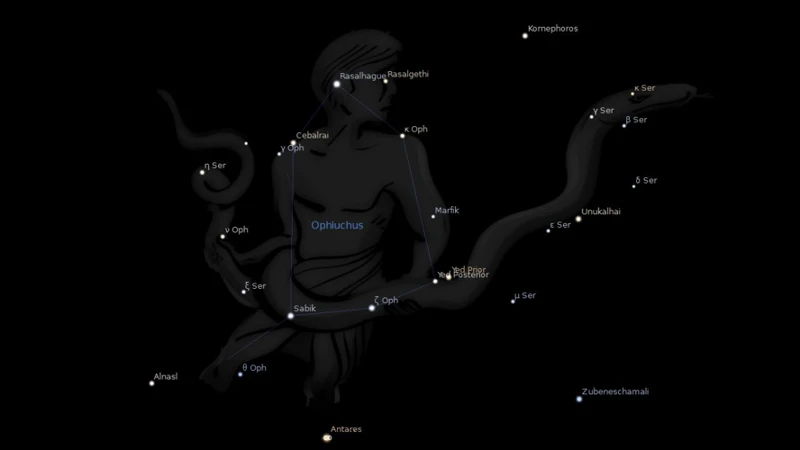
Ophiuchus in Astrology
The inclusion of Ophiuchus as a zodiac sign has sparked controversy and debate within the world of astrology. Traditionally, the zodiac consisted of twelve signs, each occupying a thirty-degree segment of the sky. However, Ophiuchus challenges this structure as a thirteenth sign, positioned between Scorpio and Sagittarius. Some astrologers argue that Ophiuchus should be recognized as a legitimate sign due to its alignment with the sun during a period of the year. Proponents of this shift believe that Ophiuchus brings unique personality traits and characteristics to individuals born under its influence. These traits include wisdom, intuition, healing abilities, and a deep connection to the spiritual realm. However, others dismiss Ophiuchus as an irrelevant addition and choose to adhere to the traditional zodiac system. Whether you embrace Ophiuchus as the 13th sign or not, its presence in astrology has certainly added an intriguing layer of complexity to the ancient practice. (source: astrologyhub..com)
The 13th Zodiac Sign Controversy
The 13th Zodiac Sign Controversy
The inclusion of Ophiuchus as the 13th zodiac sign has been a topic of much debate and controversy in the field of astrology. Traditionally, the zodiac consisted of 12 signs, each assigned to a specific period of the year. However, the discovery and recognition of Ophiuchus as a legitimate constellation brought forth the question of whether it should be included in the zodiac system. Proponents argue that Ophiuchus, with its distinct characteristics and influence, should be recognized as a valid zodiac sign. They believe that individuals born under Ophiuchus possess unique traits and qualities that differ from those assigned to other signs. On the other hand, skeptics argue that introducing a 13th zodiac sign would disrupt the balance and symmetry of the zodiac system. They argue that this change would require shifting the dates associated with the existing signs, potentially causing confusion and undermining the consistency of astrological predictions. The controversy surrounding Ophiuchus as the 13th zodiac sign continues to spark discussions among astrologers and enthusiasts alike, leaving room for individual interpretation and personal beliefs. (source: astrologybabble..com)
Ophiuchus and Personality Traits
Ophiuchus and Personality Traits
The Ophiuchus constellation has long been associated with a unique set of personality traits that are said to influence those born under its celestial influence. Individuals born under this sign are often described as insightful, intuitive, and possessing a deep understanding of the human psyche. Ophiuchus individuals are thought to possess a natural inclination towards healing and possess an innate ability to empathize with others. They are often seen as wise and have a strong desire to seek knowledge and uncover hidden truths. Ophiuchus personalities are known for their magnetism and charm, which allows them to easily draw people towards them. Their intuitive nature enables them to make astute judgments and decisions, and they often excel in fields such as psychology, medicine, and counseling. These individuals are driven by a strong sense of justice and have a natural inclination to fight for the well-being of others. With their leadership abilities and strong moral compass, Ophiuchus personalities often find themselves in positions of influence, making a significant impact on politics, society, and beyond. (source: astrolovers uk)
The Stars of Ophiuchus
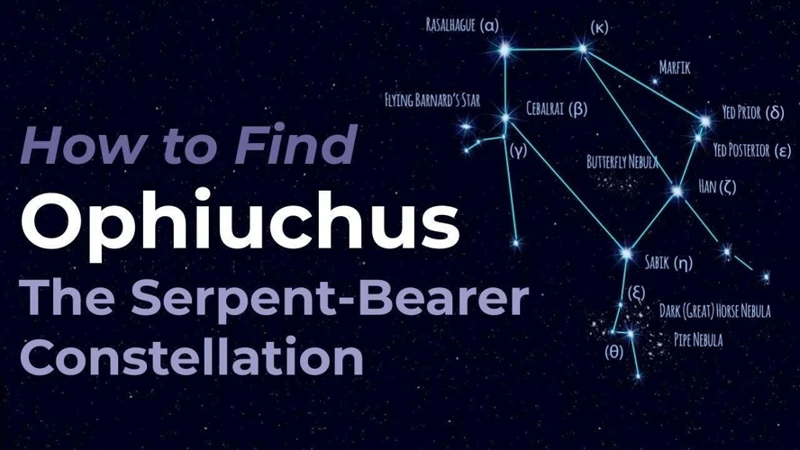
The Stars of Ophiuchus
– Rasalhague: Also known as Alpha Ophiuchi, Rasalhague is the brightest star in the Ophiuchus constellation. It is a binary star system composed of a yellow giant star and a white dwarf star. This captivating celestial pair is located approximately 48 light-years away from Earth.
– Barnard’s Star: Named after the American astronomer Edward Emerson Barnard, Barnard’s Star is a red dwarf located in the constellation of Ophiuchus. It is known for its high proper motion, meaning it moves relatively quickly across the sky. Despite being one of the closest stars to our solar system, Barnard’s Star is too faint to be observed with the naked eye.
– Sabik: Sabik, also known as Eta Ophiuchi, is another prominent star in the constellation. It is a binary star system consisting of a blue-white main-sequence star and a smaller companion. Sabik’s name is derived from the Arabic word for “precious,” highlighting its significance among the stars of Ophiuchus.
– Yed Prior and Yed Posterior: Yed Prior (Delta Ophiuchi) and Yed Posterior (Epsilon Ophiuchi) are a pair of stars that mark the serpent-bearer’s hand in ancient mythology. Yed Prior is a giant star with a luminous appearance, while Yed Posterior is a blue-white dwarf star. Together, they add to the celestial beauty and allure of Ophiuchus.
– Cebalrai: Positioned in the head of Ophiuchus, Cebalrai (Beta Ophiuchi) is a bright yellow giant star located approximately 82 light-years from Earth. Its name originates from the Arabic words for “shepherd’s dog,” symbolizing the serpent-bearer’s loyal companion in the night sky.
These mesmerizing stars within the Ophiuchus constellation create a celestial masterpiece that has fascinated stargazers for centuries. Their unique characteristics and positions add depth and nuance to the enigmatic story of Ophiuchus, further igniting our curiosity and appreciation for the wonders of the cosmos. (source: astronomysite..com)
The Modern Interpretation
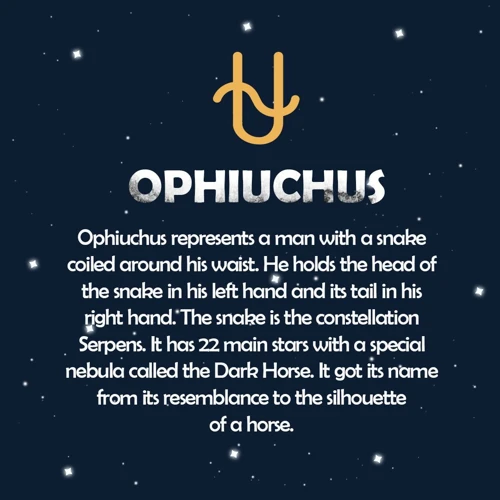
The Modern Interpretation
In modern times, the significance of the Ophiuchus constellation has extended beyond its mythological and astrological roots. One notable interpretation lies in its symbolism within the medical field. The depiction of Ophiuchus as the serpent-bearer, combined with the Rod of Asclepius, has become synonymous with healing and medicine. This symbolism is widely recognized in the medical community, adorning hospitals, medical websites, and even the emblem of the World Health Organization. The Ophiuchus constellation continues to captivate individuals who seek alternative perspectives on astrology. With its association with the controversial 13th zodiac sign, people born under Ophiuchus are said to possess unique personality traits and characteristics. While some embrace this addition to the zodiac wheel, others remain skeptical. Regardless, Ophiuchus sparks curiosity and provides layers of interpretation that transcend traditional boundaries. (source: astrologyonline.uk)
Ophiuchus and Medical Symbolism
Ophiuchus and Medical Symbolism
Within the realm of symbolism, Ophiuchus holds a special place in the world of medicine. The constellation’s association with healing and medicine can be traced back to the legendary figure of Asclepius. The symbol of Ophiuchus, the serpent entwined around a staff, also known as the Rod of Asclepius, has become synonymous with the medical profession. This symbol is widely used by healthcare organizations, hospitals, and medical practitioners, representing their commitment to healing and the preservation of health. The serpent itself has been a potent symbol of rebirth, transformation, and healing since ancient times. In Greek mythology, the serpent was believed to possess healing powers, shedding its skin as a symbol of rejuvenation. The connection between Ophiuchus and medical symbolism is further reinforced by the fact that the ancient Greeks associated the constellation with Apollo, the god of medicine. Ophiuchus, with its representation of healing and wisdom, continues to serve as a powerful emblem in the medical world, reminding us of the vital importance of health and the pursuit of healing. (source: medsymbolism..com)
The Ophiuchus Constellation Today
The Ophiuchus Constellation Today
The Ophiuchus constellation continues to captivate stargazers and astronomers in the modern era. Although not widely recognized as a zodiac sign in traditional astrology, there are enthusiasts who incorporate Ophiuchus as the 13th zodiac sign, wedged between Scorpio and Sagittarius. This controversial addition to the zodiac wheel has sparked debates among astrologers and individuals eager to explore their horoscopes in further depth. The alignment of the sun and the Earth during different times of the year determines an individual’s zodiac sign, including Ophiuchus for those who believe in its influence. However, it’s important to note that mainstream astrology still follows the traditional 12 zodiac signs. Regardless of its recognition in astrology, the Ophiuchus constellation remains a celestial marvel. Its distinct shape and stars mesmerize astronomers who study the vastness of the universe. The constellation is home to stunning celestial objects, such as the globular clusters M10 and M4, which offer a glimpse into the cosmic wonders that lie within Ophiuchus. While its role as a zodiac sign may be disputed, the beauty and fascination surrounding the Ophiuchus constellation endure in the hearts and minds of stargazers. Whether you view it as a celestial blueprint for personality traits or appreciate it as a breathtaking stellar formation, Ophiuchus continues to enchant and ignite our imagination with its celestial glory.
[source: stargazersunite..com]
Conclusion
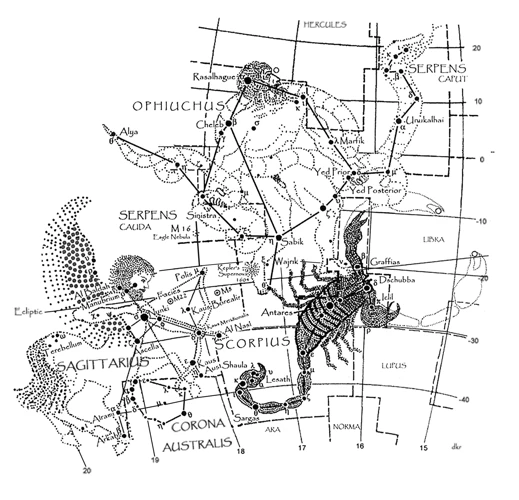
Conclusion
In conclusion, the mythology behind the Ophiuchus constellation is a captivating tale that spans across different cultures and time periods. From the legendary healer Asclepius in Greek mythology to the connections with Imhotep in Egyptian mythology, Ophiuchus holds a significant place in ancient narratives. The controversy surrounding the 13th zodiac sign and its impact on astrology adds another layer of intrigue to this enigmatic constellation. The modern interpretation of Ophiuchus, particularly its association with medical symbolism and the Rod of Asclepius, showcases its enduring significance in various fields. While Ophiuchus may not receive the same prominence as other zodiac signs, its influence and symbolism cannot be ignored. Whether one believes in astrology or not, delving into the mythology behind Ophiuchus provides a fascinating glimpse into the stories and beliefs that have shaped human history. To explore more about Ophiuchus compatibility with other zodiac signs like Aries, or to learn about famous Ophiuchus individuals and their impact on politics and society, further exploration into these topics will unveil an even deeper understanding of this celestial phenomenon.
Frequently Asked Questions
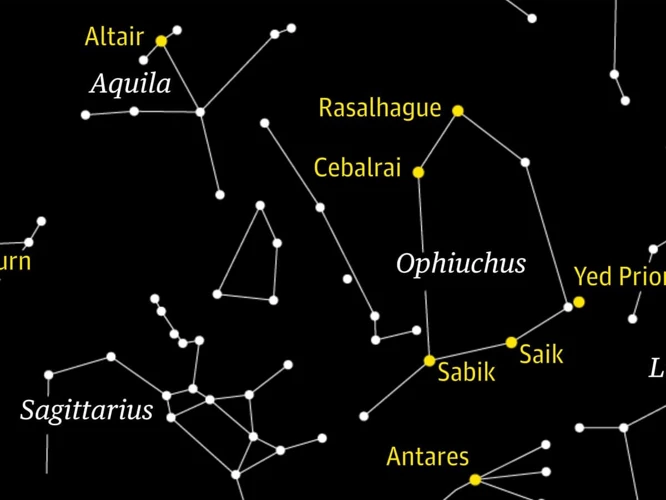
FAQs About Ophiuchus Constellation
1. Is Ophiuchus considered the 13th zodiac sign?
Yes, Ophiuchus is often referred to as the 13th zodiac sign. However, its inclusion in the zodiac system remains a subject of debate and controversy in the astrological community.
2. What is the personality traits of Ophiuchus?
The personality traits associated with Ophiuchus include being curious, inventive, and possessing a strong desire for knowledge and spiritual growth. They are often seen as intuitive, passionate, and natural healers.
3. What is the connection between Ophiuchus and the medical symbol?
The connection between Ophiuchus and the medical symbol lies in the association with the Greek deity Asclepius, the god of healing and medicine. Asclepius’ symbol, the Rod of Asclepius, featuring a serpent entwined around a staff, is widely recognized as a symbol of medical and healing practices.
4. Are there famous individuals who are Ophiuchus?
While not as well-known as the other zodiac signs, there are individuals who are believed to be born under the Ophiuchus constellation. However, it is important to note that the concept of zodiac signs is based on astrology, and its influence on individuals varies among different cultures and belief systems.
5. How does Ophiuchus impact relationships and compatibility?
There is ongoing discussion and exploration regarding Ophiuchus’ impact on relationships and compatibility within the zodiac system. Some astrologers believe that individuals born under this sign may possess unique characteristics that can affect their compatibility with others.
6. Are there any historical figures associated with Ophiuchus?
While there are no prominent historical figures exclusively associated with Ophiuchus, the influence of healing and medicine attributed to this constellation can be seen in various individuals throughout history who have made significant contributions to the field of healthcare and medicine.
7. What role does Ophiuchus play in ancient mythology?
Ophiuchus plays a prominent role in Greek mythology as the embodiment of the healer Asclepius. It is also connected to the ancient Egyptian figure Imhotep, who was regarded as a physician and architect.
8. How can I find my zodiac sign if Ophiuchus is the 13th sign?
If you are curious about your zodiac sign and its compatibility, you can refer to the widely-used zodiac system based on twelve signs. However, for those who believe in the inclusion of Ophiuchus, finding your sign may require exploring the traits associated with this constellation.
9. Does Ophiuchus have a significant presence in modern astrology?
Ophiuchus’ significance in modern astrology remains a topic of debate. While it has gained attention and recognition, its inclusion as a major influence in astrology is not as widespread as the traditional twelve zodiac signs.
10. How can I locate the Ophiuchus constellation in the night sky?
If you are interested in locating the Ophiuchus constellation, it can be found in the region between Scorpius and Sagittarius. On a clear night, you can try identifying the constellation’s distinct shape, often depicted as a figure holding a serpent.
References
Frequently Asked Questions

1. What is the significance of the Ophiuchus constellation?
The Ophiuchus constellation holds rich mythological and cultural significance in various ancient civilizations. It represents healing, wisdom, and the connection between humans and the divine.
2. Is Ophiuchus considered a zodiac sign?
Ophiuchus is not officially recognized as one of the twelve zodiac signs in Western astrology, but it is sometimes referred to as the 13th zodiac sign due to its position along the ecliptic.
3. Who was Asclepius and what is his connection to Ophiuchus?
Asclepius, a Greek demigod, is associated with healing and medicine. He is often depicted with a staff entwined by a serpent, which is now known as the Caduceus symbol, representing Ophiuchus and his connection to healing.
4. How did Ophiuchus influence ancient Egyptian culture?
In ancient Egypt, Ophiuchus was closely linked to Imhotep, who was a renowned physician, architect, and high priest. Imhotep was later deified and associated with healing and wisdom, aligning with the traits of Ophiuchus.
5. What is the story of Gilgamesh and Enkidu in relation to Ophiuchus?
In Babylonian mythology, the epic of Gilgamesh depicts a friendship between Gilgamesh, a powerful king, and Enkidu, who is often associated with Ophiuchus. Enkidu’s death leads Gilgamesh on a journey to search for immortality, symbolizing the eternal quest for healing and transcendence.
6. How does Ophiuchus impact astrology and horoscope readings?
Ophiuchus has gained attention in recent years as a potential 13th zodiac sign, causing controversy in the astrological community. Some believe that Ophiuchus should be included in horoscope readings to provide more accurate and personalized insights.
7. Are there specific personality traits associated with Ophiuchus?
As with all zodiac signs, there are various personality traits attributed to Ophiuchus. People born under this sign are often described as intuitive, wise, spiritual, and possessing a deep understanding of the mysteries of life.
8. What are some notable stars in the Ophiuchus constellation?
Ophiuchus contains several notable stars, including Rasalhague, which is the brightest star in the constellation. Other prominent stars include Sabik, Han, and Barnard’s Star, each with its own unique characteristics and influence.
9. How is Ophiuchus symbolically associated with the field of medicine?
The Caduceus symbol, represented by a staff entwined by two serpents, is commonly associated with the medical field. This symbol has its roots in Ophiuchus and the healing prowess of Asclepius, representing the art and science of medicine.
10. How is the Ophiuchus constellation observed and celebrated today?
While it may not have the same widespread recognition as the twelve traditional zodiac signs, Ophiuchus still holds fascination for astronomers, astrologers, and enthusiasts. Some individuals may celebrate Ophiuchus by studying its mythology, stargazing, and exploring its symbolism in various aspects of life.




